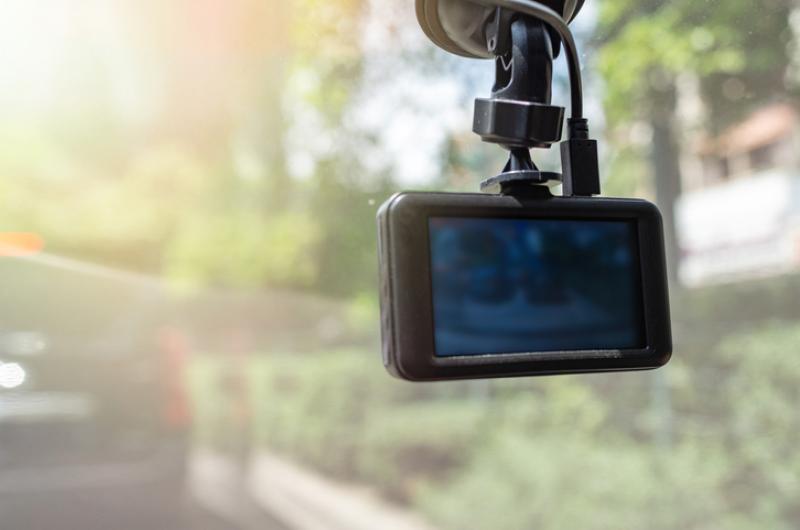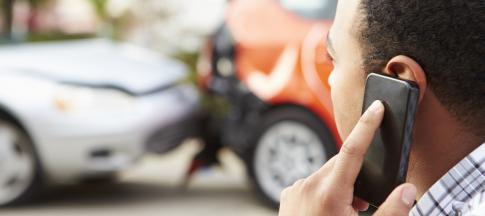
Dash cams are popular nowadays and can be helpful if you need to make a car insurance claim.
So, we’re here to answer some of your questions around how they work, what they can be used for, and what to look for when buying one.
What’s a dash cam?
A dash cam (short for dashboard camera) is a small device that fits inside your car to record the road. There are four types of dash cam:
- Forward-facing
- Front-and-rear-facing
- Rear-facing
- Interior-view
Forward-facing cameras are the most used type of dash cam. They’re affordable but only record in front of the car.
Front-and-rear-facing cameras are usually expensive but can protect you against rear-end collisions too.
How do dash cams work?
It depends on your model.
Generally, they work by recording footage on a loop, saving new recordings over old ones.
Most are wi-fi enabled to make it easier to transfer footage to other devices. Some have an app to go with it and you can download to your phone.
Others have a built-in sensor that picks up sudden changes in G-force. G-force is how acceleration is measured.
For example, if another car collides with yours, it’ll automatically record and save it.
Choosing a dash cam
There are a few things to consider when buying a dash cam:
- Video quality – one of the most important things is making sure it has a high-resolution , so you can clearly see number plates and any other details in the video.
- Night-time recording – it's a good idea to get a dash cam that has night-time recording, so you can still see incidents that happen at night clearly.
- GPS – some come with built-in GPS which adds locations to your video clips, so you know exactly where something happened. This can be very useful if police or insurers are using the video as evidence.
- Parking mode – some models come with this included, which detects bumps or collisions even when your car is parked.
Can I use my phone as a dash cam?
Yes, you can.
If you don’t want to spend money on a dash cam, you can use a phone, whether that’s an old one or your current one.
All you need is a phone mount and to download one of the many free dash cam apps available.
Just make sure your phone is mounted properly and safely to your dashboard, and don’t use it when you’re driving.
Where to put a dash cam
Your dash cam should sit behind your rear-view mirror. That way, it can record both sides of the road, and it won’t block your view.
UK law states your dash cam shouldn’t sit more than 40mm into the area your windscreen wipers cover.
Your dash cam can't block your view when you install it either. If your dash cam blocks your vision or distracts you, and you’re involved in an incident, insurers could put you at fault.
How to fit a dash cam
There are two ways to install it:
- plugging it into the 12v socket (the old lighter)
- hardwiring
While the first option is easier, hardwiring is the neatest as you can hide the wires. Most dash cams come with a lead that’s long enough to tuck it away around the edge of the windscreen.
Don’t plug it in and leave the cable dangling. At best, it'll be annoying – at worst, it could be distracting and dangerous.
The dash cam itself usually attaches to the windscreen with a suction cup. You can find guides on hardwiring a dash cam, but places like Halfords can also do it for you.
How long does dash cam footage last?
It depends on how much storage space the dash cam has, but typically around 3 to 50 hours.
If there’s been an accident or you want to report something to the police, it’s a good idea to get the footage from the dash cam as soon as possible, just to be safe.
You can either upload it to your laptop or directly to your phone, depending on the type of dash cam you have and if it has its own app.
Do dash cams record audio?
A lot of modern dash cams come with a built-in microphone to record audio, but not all of them.
It’s worth double checking before you buy.
How much is a dash cam?
Prices vary. The most basic models start at around £20, with higher-end ones costing up to £400.
You should prioritise footage quality - any other features are nice to have.
Do dash cams work when the car is off?
It depends on the model. Make sure you buy the right one that records when the engine is off if you need that.
Should I get a dash cam?
Dash cam footage is useful. Some car insurance providers (including us) use it if it’s available when you make a claim.
It can help work out who was at fault. It’s worth getting one if you can afford it, but it isn’t necessary.
Dash cams and the law
Dash cams are a useful way of holding other drivers (and yourself) to account.
It means dangerous or illegal drivers are less likely to get away with crimes, as there’s often video footage of what happened.
Below, we discuss any laws around dash cams and how the police might use the footage.
Are dash cams legal?
Dash cams are legal in the UK. However, you must let passengers in your car know if you’re recording the inside.
It’s a breach of privacy laws to record someone without their consent.
Can you report drivers with dash cam footage?
Yes, you can.
If you’ve seen someone driving dangerously or illegally and decide to report them to the police, you can use the dash cam video your car captured as evidence.
This might mean they’re more likely to find and prosecute the person who was committing a crime, whether that was speeding or something else.
Can police prosecute with dash cam footage?
Yes, they can.
If you or someone else has dash cam footage that shows someone breaking the law, the police can use it to get a prosecution.
Can dash cam footage be used as evidence or in court?
Yes.
Dash cam footage can be used as evidence in court to help the police prosecute a case.
The footage might be played to the judge or jury to help them make a decision.


